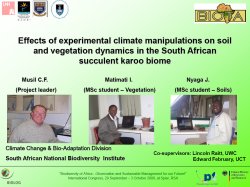| Details of the presentation |
| Presentation |
Oral presentation |
| Title |
Effects of experimental climate manipulations on soil and vegetation dynamics in the South African succulent karoo biome
|
| PDF Download |
 Download PDF (Filesize 5.4 MB)
Download PDF (Filesize 5.4 MB)

|
| Short title |
Experimental approaches to climate change effects
|
| Author(s) |
Musil, C.F.; Nyaga, J.; Matimati, I.
|
| Presenting author |
Musil C.F.
|
| Institution(s) |
South African National Biodiversity Institute
|
| Keywords |
Climate change; plant metabolic impairment; plant mortality; soil respiration; soil nutrients
|
| Abstract |
The climate above different soil substrates and around succulent plant populations was altered with transparent hexagonal open-top chambers which elevated air temperatures 2.5°C to 3.8°C above ambient and with precipitation exclusion enclosures which reduced rainfall, fog and dew fall. In the precipitation exclusion chambers, soil respiration rates, soil moisture and N contents were all reduced but only on shale covered substrates. After a fog event, succulent plants with the CAM photosynthetic pathway displayed a transient period of daytime stomatal indicating a temporary switch from CAM to C3 photosynthesis. In the experimentally warmed chambers soil respiration rates were unaltered but quartz field succulents displayed massively (up to 90.2%) reduced leaf densities and canopy covers with small sparsely branched species comprising single leaf pairs per axis exhibiting much greater reductions than large, shrubby or creeping species with multiple leaves. These findings supported the hypothesis that mild anthropogenic warming could exceed the thermal thresholds of many southern African quartz field succulents of the subfamily Ruschioideae, which rapidly diversified during the cooler Pleistocene period, leading to metabolic impairment. This impairment explained by an observed loss in the catalytic efficiency of Rubisco at daytime temperature extremes exceeding 54°C, preceded by a decrease in PSII electron transport commencing at temperatures much lower than the threshold for Rubisco de-activation.
|
| Congress Topic |
Process Analysis
|
| Topic No. |
2.8 |
| Notes |
---
|
| Ref. No. |
619 |
